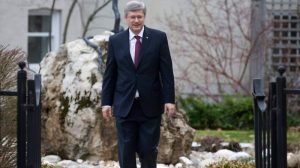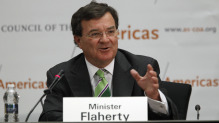
The Irony… This Week’s most Ironic Stories Surrounding the Government of Canada

Supreme Court of Canada makes ruling
The Supreme Court of Canada decided that private government documents should remain private after the case was initially brought to the court in the 1990s.
When Stephen Harper was the leader of the Reform Party in the 1990s, he and his party had a dispute about how PM Jean Chretien ran his daily agendas and wanted to access private government documents. At the time, Laurie Throness, chief of staff to the current transport minister, made the request while she was a researcher for the now-defunct Alliance Party, a precursor to the current governing Conservatives. She now joins her party, and her leader, in their major flip flop to ensure that documents stay private. Depending on which Harper you look at, this can be win or lose. If we consider Harper as a Reformer in the 1990s when Chretien came under fire for police brutality at an event, this is a major loss. If we consider Harper as a Conservative from 2006 to present, this is a major win.
The irony: Harper initially wanted a transparent government where he could access the documents that Jean Chretien had while he was in government, but now that Harper is in government, and the opposition wants in, there is no chance of that!
We can go to a further extent and say that it is ironic that Harper won in 2006 initially on a platform of accountability, and passed the accountability act, but now that his staff are being found to be lobbyists and convicted fraudsters – notably his right hand man Carson – everything is alright and it can be swept under the rug.
On a side note, the Canadian Journalists for Free Expression has released a document entitled “Like Sheep to Slaughter” which gives the Harper Government an F- when it comes to access of information. It urges Canadians to be vigilant on their freedom of expression.
“More than half of the federal institutions surveyed for their performance on access to information ranked below average and five failed outright. The governing party was ruled in contempt of Parliament for failing to produce information about major spending programs. All of which may explain why journalists seem to be using the access system less often than in the past.”
“Like Sheep to Slaughter” – Canadian Journalists for Free Expression
Statistics in the report say that 44% of federal access to information requests aren’t met in the 30-day limit and it takes an average of 395 days to resolve a complaint concerning access to information.
“We shouldn’t be complacent about our free expression rights here in Canada,” said Bob Carty, CJFE board member and journalist who was one of the authors of the 40 page report.
“The structural problem of access to information on the one hand and the spontaneous events of the G20 summit show areas where we have to be very vigilant,” he told CTV.
“There’s an opportunity right now for the Harper government to do the right thing to make this a more accessible government,” said Carty. “We will be watching the Harper government’s performance in deeds not words.”
“There is reason for concern,” said Carty. “If we drop our guard we better be very careful about where our country and democracy is going.”
The report gave the Office of the Information Commissioner was given an above average grade, and Suzanne Legault, an A-.
Kiss the Surplus by 2014-15 Goodbye – It was only a ploy to get your vote

The election results are barely a week old and the Globe and Mail Reports that the revised 2011 budget that will be presented next month will not show a surplus by 2014-15 as promised in the Conservative platform. This is the same platform that Flaherty tweaked publically and announced $11 billion in cuts to make the surplus appear a year sooner than that.
However, despite the lack of appearance in the Budget, Flaherty insists that he will have economists look at it and get back to us… that is politician lingo for “never going to happen, sorry folks.”
“We will do the strategic and operating review and we will book [those savings] once the review is done. That will get us to balance a year earlier, but is not part of the upcoming budget,” Chisholm Pothier, Mr. Flaherty’s spokesperson.
On CTV’s Power Play, Flaherty denied that he was committing to eliminating a year earlier – as he and his party did in the 2011 election.
Flaherty told Power Play, “No. I think we have to look at all of the data. We use an average of the private sector forecasters, as we have done for years now, to make sure that we’re on the right track, and in sync with the view of the private sector on the economy, so we’ll look at all these things, there’s a couple of platform commitments too that we’ll look at as well, but fundamentally it will be the same budget that was introduced on March 22.”
In other words, Flaherty just admitted that the Conservatives lied when they went around waving the extra $11 billion in cuts the the year advancement in deficit elimination and said that they found the $11 billion in the budget when he clearly states that he did not.
The Conservative Platform stated: “Through accelerated reductions in government spending, a re-elected Stephen Harper government will eliminate the deficit by 2014-15.”
The irony: First: The Conservatives claimed they would fix the economy after destroying it. Second: The Conservatives said they were sure that they could achieve this goal when they now say that they can’t. Lastly: The Conservatives claim that they can afford jets and corporate tax cuts and prisons when they are stating that they want to make cuts in public spending. (Logically, cuts mean cuts, not added spending and then cuts… spending extra defeats the purpose.)
On an added note, Harper warned that if the NDP were elected, gas prices would sky rocket… less than a week into his mandate, and gas prices skyrocketed…
WikiLeaks Strikes Again… This time Concerning the Arctic and Afghanistan

The Americans just aren’t buying Harper’s arctic promises, but instead thinks that it is nothing more than a political joy ride, a WikiLeaks cable suggests. The cable came from the US Embassy in Ottawa and was posted by an online whistleblower.
“Conservatives make concern for ‘The North’ part of their political brand . . . and it works,” says the note, entitled “Canada’s Conservative Government and its Arctic Focus.”
“The message seemed to resonate with the electorate; the Conservatives formed the new government in 2006.”
The cable was dated January 2010 and bears US Ambassador David Jacobson’s signature. The document goes on to make fun of Stephen Harper, stating,
“The persistent high public profile which this government has accorded ‘Northern Issues’ and the Arctic is, however, unprecedented and reflects the PM’s views that ‘the North has never been more important to our country’ — although one could perhaps paraphrase to state ‘the North has never been more important to our Party.'”
The cable also outlines the American view of broken promises in the North.
“Once elected, Harper hit the ground running with frosty rhetoric,” the notes says, referring to his 2006 election.
“Harper (who was still only Prime Minister-designate) used his first post-election press conference to respond to the United States Ambassador’s restatement the prior day of the longstanding U.S. position on the Northwest passage.”
The cable said that bringing it up again in 2008 was a continuation of rhetoric, stating, “That the PM’s public stance on the Arctic may not reflect his private, perhaps more pragmatic, priorities, however, was evident in the fact that during several hours together with Ambassador Jacobson on January 7 and 8, which featured wide-ranging conversations, the PM did not once mention the Arctic.”
The irony: Americans support Stephen Harper in public on the economy, and foreign policy, but in leaked cables, a new mind set of American officials’ views on Harper are portraying the opposite. The Americans went into damage control as this leak was a hard one for the Canadian Government to swallow lightly.
This is not the only time the Americans were exposed as being critical of Harper. In an earlier leak, the Americans criticized Harper’s handling of proroguing, senate reform, mocked his crime agenda, and criticized his piracy record.
In another recent leak, the Afghanistan mission was viewed as a “political football.” The leak states that Canada reconsidered the Afghan combat end date in 2009 and was released from a US diplomatic cable.
The March 15 cable, marked secret, said that the ministers “agreed that ‘all options are back on the table’ with respect to Canada’s military role in Afghanistan after 2011.”
The cables release more information about conversations that were held between the Department of Foreign Affairs and International Trade.
“It will take time for the government’s public rhetoric to catch up to this ‘new reality,’ however, requiring some ‘patience’ on the part of allies,” the senior adviser apparently told U.S. officials on March 16.
He urged that Allies should not “publicly press” Canada to extend its troop deployment past 2011.
A “truly final decision” would have to be made by fall of 2010, with a plan in place by Jan. 1, 2011, due to operational requirements.
The cable acknowledges that an extension to the combat mission in Afghanistan was a “highly sensitive political football.”
“PM Harper and his Cabinet would be venturing into politically sensitive territory to try to re-sell a further extension to an increasingly dubious Canadian public,” the cable said.
The cable also stated that the topic would be a goldmine to recently defeated Michael Ignatieff and his Liberals. “Official Opposition Liberal Leader Michael Ignatieff — who has also been firm about the 2011 deadline — has repeatedly accused PM Harper of going back on his word of obfuscating on other issues.”
The Americans allegedly used this weakness on Harper’s part to make sure that he stuck to plan.
“Several weeks later — ahead of an important NATO meeting in France — the United States put forward a demarche, a formal diplomatic request, asking Canada to consider a combat mission beyond the scheduled 2011 end date, another diplomatic cable dated April 3, 2009, shows.
The request, sent April 2, 2009, was delivered to the prime minister’s national security adviser, Marie-Lucie Morin, and senior foreign affairs and privy council staff.
Canadians likely spent night ‘struggling’
The U.S. request asked that Canada “remain open to reconsidering its plan to withdraw combat forces after 2011” or at a minimum, keep reconstruction and training teams in Kandahar past the date.
Morin stressed that Harper in his public comments had so far “been clear on the 2011 position.” But U.S. officials surmised that “intervention at the highest level might get the Prime Minister to show his cards.”
The cable goes on to say that the April 2 request “likely went straight to the Prime Minister’s party in Strasbourg,” where world leaders were gearing up for a two-day NATO summit.
“Canadian officials probably spent the night struggling to formulate a response,” U.S. officials mused.
American officials were also well aware that the very act of issuing the formal request had complicated Harper’s public response on Afghanistan.”
The rest of the cable discusses high profile meetings between Harper and NATO and how countries maneuvered themselves to keep the Afghan mission alive.




